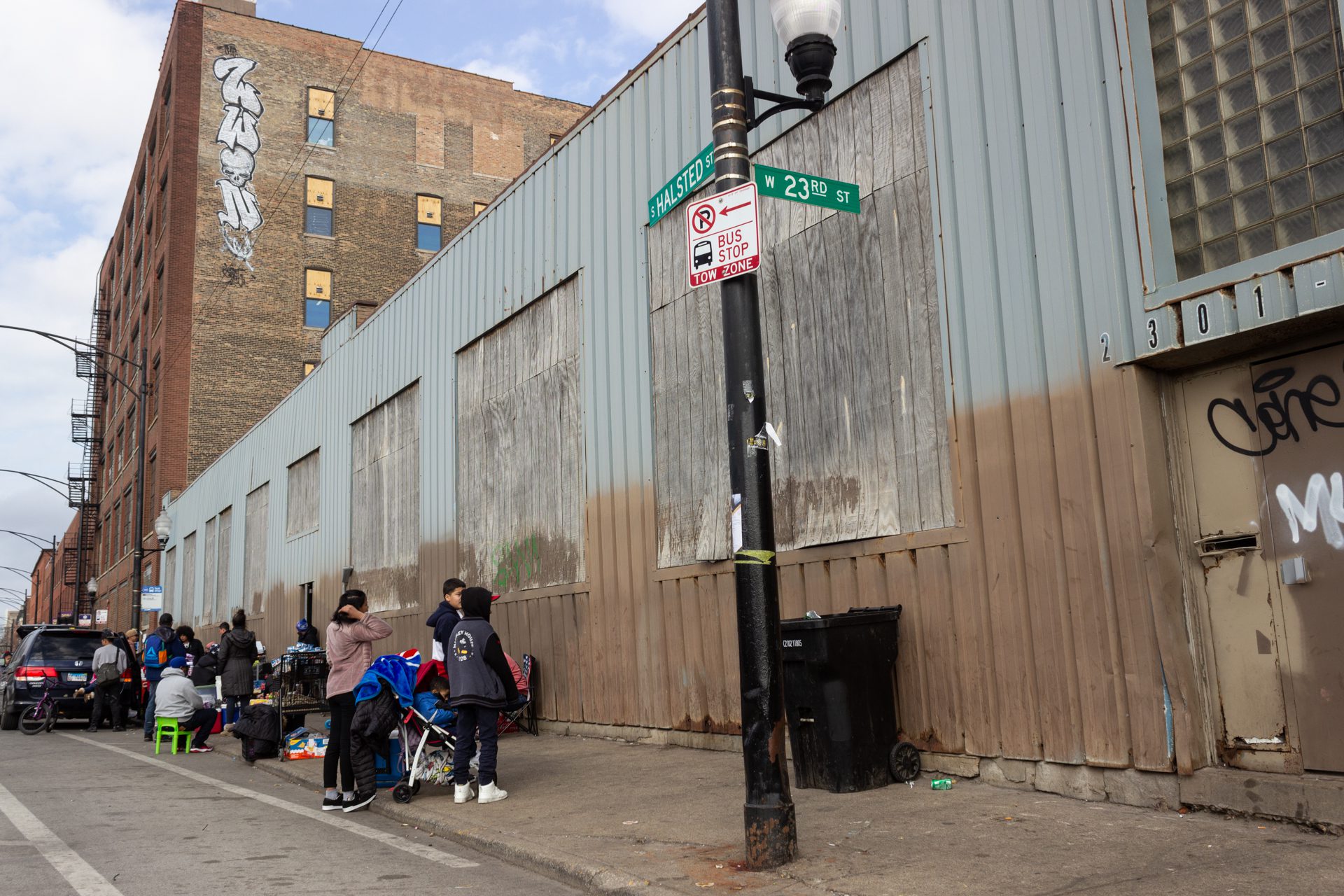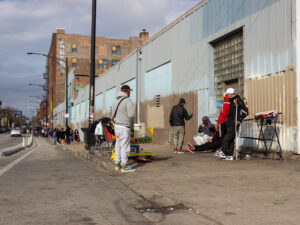 Mauricio Peña/Borderless Magazine
Mauricio Peña/Borderless Magazine Los casos se suman a la creciente preocupación por las condiciones sanitarias en los centros de acogida de inmigrantes de la ciudad tras la muerte de un niño de 5 años y un brote de casos de sarampión.
Las autoridades de Chicago confirmaron el miércoles por la tarde un "pequeño número" de casos de tuberculosis en albergues para inmigrantes gestionados por la ciudad, lo que vuelve a suscitar preocupación por las condiciones sanitarias de los centros de acogida temporal de emergencia.
El Departamento de Salud Pública de Chicago confirmó a ABC7 Chicago y The Chicago Sun-Times casos de tuberculosis entre los inmigrantes recién llegados. El CDPH no reveló cuántos migrantes dieron positivo en la prueba de la tuberculosis ni qué albergues se vieron afectados.
Al menos cinco personas fueron trasladadas a hospitales desde el mayor albergue de inmigrantes de la ciudad, en Pilsen, a causa de la tuberculosis, según un inmigrante que habló con Borderless.
¿Quiere recibir historias como ésta en su bandeja de entrada todas las semanas?
Suscríbase a nuestro boletín gratuito.

En X (antes conocido como Twitter), Concejal Raymond López (15º) criticó a la administración de Johnson, exigiendo los registros de vacunación de los migrantes e incluyendo una foto en la que aparecían al menos tres migrantes con tuberculosis.
El albergue -un antiguo almacén en un distrito manufacturero- acoge a 1.334 migrantes y también ha sufrido un brote de sarampión y la muerte de un niño en los últimos meses.
En un comunicado, el CDPH afirmó que "tenía conocimiento de un pequeño número de casos de tuberculosis entre los recién llegados a algunos refugios diferentes en el transcurso de la respuesta", declaró Jacob Martin, portavoz del CDPH.
"El CDPH sigue tomándose los casos muy en serio para mantenerlo contenido", dijo Martin.
Según los Centros para el Control y la Prevención de Enfermedades (CDC), la tuberculosis está causada por una bacteria que suele atacar los pulmones, pero también puede atacar otras partes del cuerpo. Los síntomas incluyen dolor torácico, fatiga, escalofríos o tos con sangre o flemas.
La tuberculosis puede propagarse rápidamente en entornos de congregación, como los refugios para personas sin hogar y de emergencia. Según los CDC, la tuberculosis es "prevenible y tratable en la mayoría de los casos" y puede propagarse cuando "las personas con enfermedad activa reciben tratamiento ineficaz o incompleto."
Si no se trata, la tuberculosis puede ser mortal.
La noticia llega en un momento en que la ciudad ha luchado por contener otras enfermedades infecciosas en los centros de acogida de inmigrantes gestionados por la ciudad.
El mes pasado, el sarampión fue primer registro en un albergue, y los casos han aumentado en las últimas semanas. Según el CDPH, se han notificado más de 56 casos en toda la ciudad, la mayoría relacionados con el albergue de Pilsen.
Los casos de sarampión se produjeron tras la muerte de Jean Carlos Martínez Rivero, de 5 años, que falleció de septicemia por estreptococos del grupo A en diciembre. En el momento de su muerte, también estaba enfermo de adenovirus, COVID-19 y resfriado común.
Las enfermedades infecciosas se propagaron en el refugio de Halsted durante meses con poca atención médica o mitigación de la ciudad, dijeron los migrantes a Borderless en una investigación publicada en diciembre, antes de la muerte de Martínez Rivero.
Los migrantes hablaron de la propagación de la varicela, la gripe y otras infecciones de las vías respiratorias superiores, y otra investigación de Borderless descubrió que había docenas de casos médicos que aquejan a los residentes del refugio de Halsted, con al menos 16 residentes trasladados al hospital en noviembre.
Los informes de incidentes obtenidos por Borderless y archivados por el personal del refugio revelaron casos de ambulancias que fueron llamadas por un un niño de cuatro años con dolor torácicoUn residente con fiebre y dolores corporales, un residente con la cara caída y un residente con fiebre alta que no sentía las manos ni los pies.
Después de que se descubriera el primer caso positivo de sarampión en el albergue de inmigrantes de Pilsen, el CDPH impuso una cuarentena de 10 días a los residentes del albergue, que desde entonces los inmigrantes han calificado de confuso y sorprendente.
Desde mediados de marzo, el CDPH, con el apoyo de los CDC, ha vacunado a más de 5.000 migrantes con la vacuna contra el sarampión, las paperas y la rubéola (SPR) para contener la propagación del virus.
La ciudad impuso un política de cuarentena en el centro de acogida de Halsted que exigen que los niños pequeños no vayan a la escuela ni a la guardería hasta al menos 21 días después de haber sido completamente vacunados contra el sarampión. Las directrices también establecían que todos los residentes del refugio debían recibir una segunda dosis de la vacuna triple vírica 28 días después de su primera vacuna si no han sido vacunados previamente.

Da poder a las voces de los inmigrantes
Nuestro trabajo es posible gracias a las donaciones de personas como usted. Apoye la información de alta calidad haciendo una donación deducible de impuestos hoy mismo.

